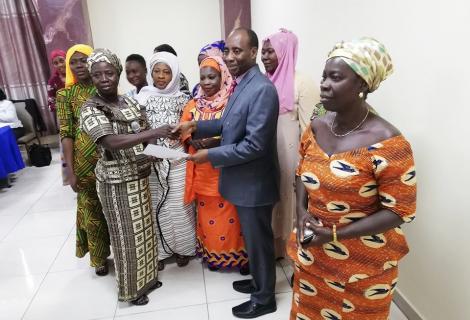Communiqué: Smallholder women farmers call for agroecology and promotion of their rights

COMMUNIQUÉ ISSUED BY SMALLHOLDER FARMERS AT THE 3RD ANNUAL NATIONAL WOMEN FARMERS’ CONFERENCE ON THURSDAY, 24TH OCTOBER 2019 AT THE TOMREIK HOTEL IN EAST LEGON
We are members of the National Women Farmers’ Movement, an advocacy group of smallholder women farmers from nine regions in Ghana: the Upper East, Upper West, Northern, North East, Bono, Ahafo, Bono East, Volta and the Oti Region working for the empowerment of smallholder women farmers in rural communities across the country.
Launched in the Upper West Region of Ghana in 2017, the movement comprises of over 10,000 smallholder women farmers who are passionate about campaigning for sustainable agriculture by influencing government policies and programmes through engagement and advocacy work.
Since our inception, we have participated in the review of the Planting for Food and Jobs (PFJ) programme, engaging government to reduce the required land size of five acre to one acre and below to increase smallholder women farmers’ enrolment unto the scheme as well as incorporate women farmer-friendly crops like groundnuts, soya beans and cowpeas into PFJ, which were previously excluded. We also advocate against the burden of Unpaid Care Work, which refers to work done by women such as cooking, taking care of kids, fetching water, laundry, etc. which deprives women of time to engage in economic and farming activities for their empowerment.
As the effects of the climate crisis increases, taking its toll on people living in poverty and endangering the livelihoods of smallholder farmers, especially women, we focus our efforts on campaigning for agro-ecological practices that is not only sustainable and environmentally-friendly but promotes resilient livelihoods, guaranteeing food security for rural families and communities.
As we converged on Tuesday, 22nd October 2019 to kick-start our three-day annual conference on the theme, “Building Resilient Livelihoods for Women and Smallholder Farmers through Agroecology”, we have been sharing our experiences on some on-going government programmes in the food and agricultural sector.
In light of the discussions we have had prior to today’s meeting, we are issuing this communiqué addressed to government and its institutions to highlight some challenges we face accessing its flagship programmes as well as to make recommendations to address these challenges.
Some of the issues include:
- Identification of beneficiaries under the Rearing for Food and Jobs (RFJ) Programme has taken a partisan face, depriving some women farmers whose lives can be better improved from this Programme from receiving support.
- Most smallholder women farmers’ inability to meet the housing requirements under the Rearing for Food and Jobs Programme has resulted in less than 40% of the beneficiaries being women. For example, in the Upper West Region, only 14% of the beneficiaries under the Sheep Module are women.
- Heavy reliance on synthetic agrochemicals and hybrid seeds that have been integrated into Planting for Food and Jobs; as against promotion of agro-ecological practices such as organic fertilizers and farmer-managed seed systems.
- Women’s lack of access to secured farm lands limit their ability to participate in government interventions like Planting for Export and Rural Development (PERD).
We, the National Women Farmers’ Movement, therefore make the following recommendations to address the above challenges we face:
- Government should take immediate steps to halt the current partisan selection of beneficiaries under the Rearing for Food and Jobs (RFJ) Programme; ensuring the provision of opportunity to all women, regardless of party affiliations. We, hereby, endorse an open and just selection process with the involvement of the District Women Farmers’ Movements.
- Government should strictly ensure that at least 40% of beneficiaries under Rearing for Food and Jobs are women and support those who do not meet the housing requirements by providing them with animal pens.
- Government should promote agro-ecological practices such as organic fertilizers and farmer-managed seed systems, minimising the importation of synthetic agrochemicals that have negative impacts on the environment and human health. We strongly call for a national policy that promotes agroecology instead of subsidizing chemical fertilizers.
- Whilst commending government for the on-going construction of warehouses (buffer stock facilities) to reduce post-harvest losses, we demand a national programme on standard measurement for farm produce to reduce exploitation of smallholder women farmers from middle buyers.
- We acknowledge the inclusion of women-friendly crops like groundnut, cowpeas and soya beans under the Planting for Food and Jobs Programme. However, the seeds of these crops have not been made available in the last planting season. We therefore call for support to women farmers to produce and make the seeds locally available.
- In relation to the Planting for Export and Rural Development (PERD) Programme, smallholder women farmers should be supported to have secured access to lands in order for them to take full advantage of the programme.
In conclusion, we call on the government, through the Ministry of Food and Agriculture, to work closely with the National Women Farmers’ Movement and the National Agroecology Movement to effectively implement its flagship programmes to the benefit of smallholder women farmers.
Thank you.
Signed,
Veronica Gbande
President, National Women Farmers’ Movement